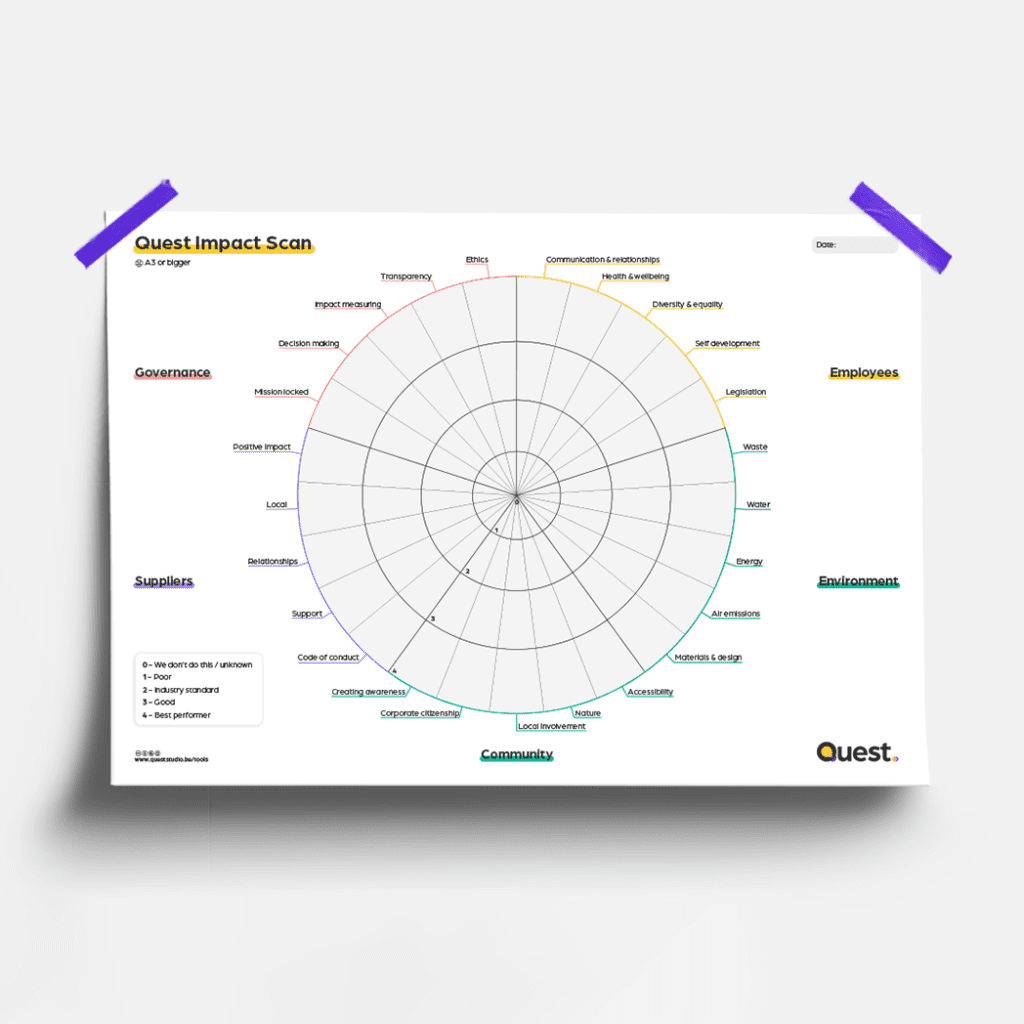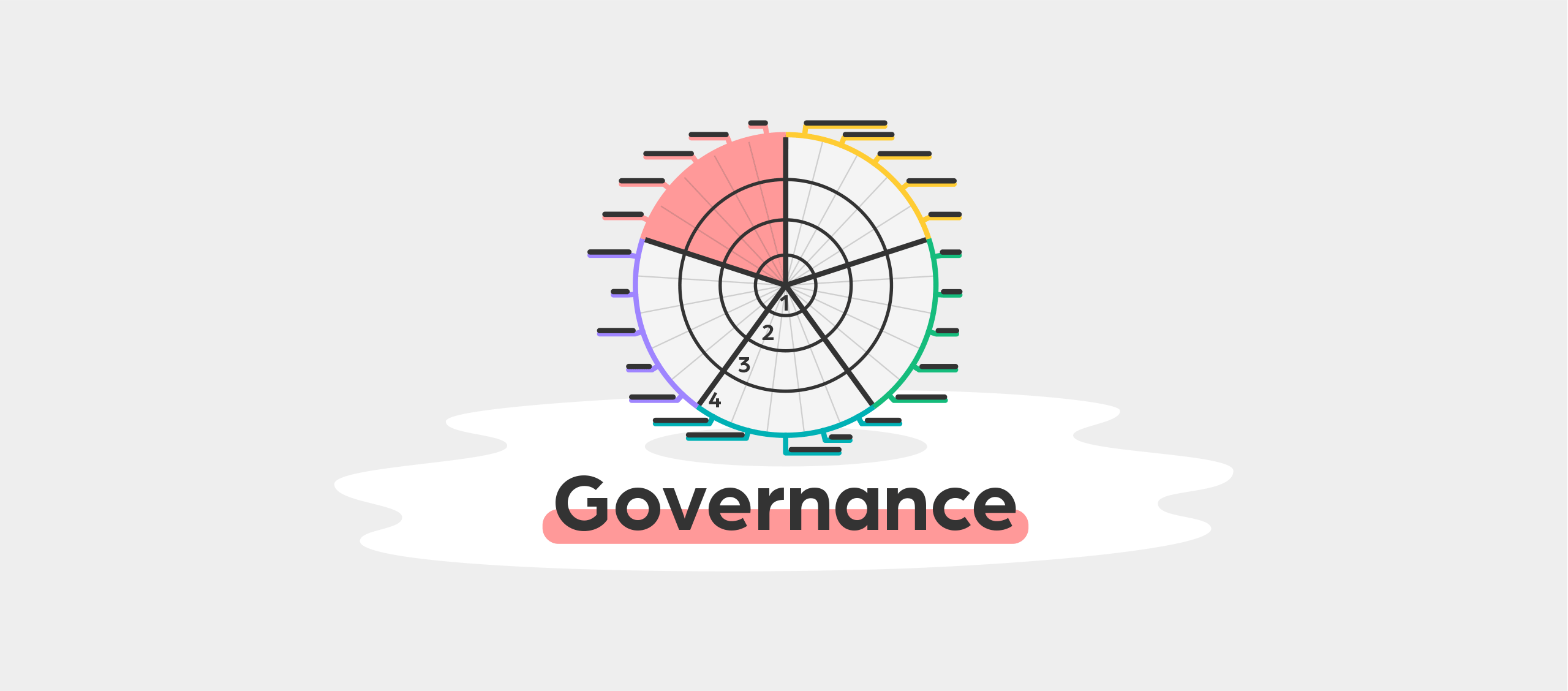Page content
Measuring = Knowing
If you don’t know your company’s successes and downfalls, it’s impossible to improve. So measuring impacts is the very first thing a company should do. The Quest Impact Scan provides a clear framework to visualize your company’s impact on all levels.
But measuring is just the beginning. If you want to make a real positive change, you need to embed impact into your organization. Impact KPIs and metrics will help to continuously measure your company’s progress and introduce a mindset of evaluating performance in other ways than only monetary. Ideally, your progress towards positive impact is reviewed internally by the board and externally by a third-party auditor.
Impact measuring across all elements of your organization (employees, environment, communities, suppliers) can be complicated and needs a strong push from decision-makers. That takes us to the next section of sustainable governance: decision-making.
Decisions, decisions…
A leadership team and management committed to positive impact are essential for a company transitioning towards a more sustainable future. Focussing on long-term value creation rather than short-term benefits is still counterintuitive to a lot of companies. But being sustainable, by definition, means successfully sustaining a solution for a long period of time, so long-term sustainable value creation should be the focus.
In order to truly prioritize sustainability and incorporate impact in decision-making, it’s crucial to train management and employees on all key factors to consider when making decisions. What’s material for the company? And what’s the company’s vision on each material aspect? Another way to reassure impact-driven decision-making is by tying compensation to impact performance, and not only revenue or profit.
Focussing on long-term value creation rather than short-term benefits is still counterintuitive to a lot of companies. by definition, means successfully sustaining a solution for a long period of time.
Janao Denys, Service Designer at Quest
A sustainable company is an ethical company
…Or it should be. Having a code of ethics for all internal (from employees to the Board of Directors) and external stakeholders (suppliers), from employees to the board and suppliers, is just the start. Enforcing this code of ethics and having a breaching policy in place is just as important. Yet, allowing people to sign a document they do not understand is not the solution. Training internal stakeholders on the code of ethics and how to apply it accordingly is essential to making intentional change.
Additionally, financial controls and anti-corruption practices must also be in place. Together with reporting on these topics and preventing breaches, a whistleblower policy will encourage openness in the workplace.
Try our Impact Scan Programme
In our programme, our team will guide you through the following:
- Goal Setting
- Market & Competitor Research
- Internal Employee Interviews
- Insights & Roadmap
Your insights will provide an actionable roadmap to help you pave a future-proof impact strategy journey.
Ready to get started? Schedule time with our team!

Transparency is not just a buzzword
Disclosing information to all stakeholders is very important to create a culture of trust. Internal reporting on financials, executive compensation, ownership of the company, and members of the governing body is essential if you want to call yourself a transparent company. In addition to this, you need honest impact reporting to all internal and external stakeholders. This step will not only strengthen your position in the market but will showcase your dedication to transparency. And as a result, will help customers to make more informed purchasing decisions.
Mission Locked
It’s time to make a real commitment to positive impact. If you implement the actions suggested above, your company is already taking substantial steps in the right direction. But including your focus on positive impact in your mission statement, quite literally, makes a statement. It pushes you to go beyond the norm and inspires others to do the same. After all, public advocacy for sustainability is what creates awareness among a broader audience. In most countries, it is also possible to legally ensure that your company’s social and environmental mission will be maintained, regardless of company ownership by including it in your company’s bylaws. This is the ultimate commitment to making a positive impact. And one of the key characteristics of the B Corps.
All this information can be a bit overwhelming, and that’s understandable. Start by taking small steps like filling out the Quest Impact Scan. Next, you can identify where you want to grow as a company and which changes would make the biggest impact. If you need help, Quest is here to guide you!




